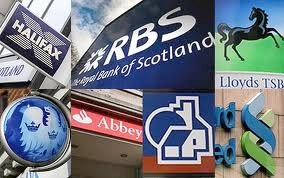Are we invested in any banks?
This is currently the most common question posed by clients. The short answer is no we are not. Our main managed portfolios have not been invested in any banking shares since 2014.
The long answer is still no we are not invested in banking shares, but I would like to explain a little more. The vogue currently is to invest passively, that is to just buy the whole index. In the case of a FTSE 100 index tracker, every investor who holds a tracker fund holds all the major bank shares. HSBC, Lloyds, Nat West, Barclays & Standard Chartered Bank. They also hold all the major insurance companies – Prudential, Legal & General and Aviva. We hold no UK listed insurance companies in our portfolios either.
Why have you also mentioned Insurance Companies?
I’ve added the insurance companies to the banks because they both exist in the Financials Sector of the FTSE 100 index. Together they made up 17.67% of the index as at 31/12/2022. That percentage will be much lower now. We hold 0% Financials. Investing directly in individual shares allows us to hopefully screen out the duds. Something that cannot be done when clients just settle for index tracking in their portfolios.
Several US banks and a major bank in Switzerland have gone bust, will more follow?
There could be more failures like those of Credit Suisse and Silicon Valley Bank and more bail-outs, a lot depends on how the central banks get a lid on inflation and how governments and multi national companies manage the pressure they are facing from employees demanding more income to cope with these inflationary rises.
Surely higher interest rates mean the banks make more profit, because they are reluctant to pass higher interest rates to savers but swift to increase mortgage rates?
This seems like a sensible assumption. The banks couldn’t make a reasonable margin when interest rates were near zero percent over the last decade. Hence, we screened them out of our portfolios. Now they appear to be making a net 2-3% profit on mortgages and bank deposits, so collectively they should become more profitable and their share price should rise. However the value of any business is based on what they make and what they own.
Could you explain that in layman’s terms please?
All companies undertake financial reporting. They prepare annual accounts which comprise of a Profit & Loss Account and a Balance Sheet. The profit and loss account is simple to understand. After all administrative costs have been taken into account such as labour costs, rent, rates etc., was there a taxable surplus left – a profit – or were the costs higher than the income – a loss. The balance sheet is more complicated, especially in the case of a financial company. The balance sheet is where past undistributed profits are held along with the shareholder capital, in most cases the greater the size of the balance sheet the greater the value of a company. The balance sheet can hold factories, offices, subsidiary companies, company shares, cash and in the case of very large financial undertakings like banks and insurance companies, also corporate bonds and government gilts. The quality of the balance sheet and how readily realisable the assets are is all important. You cannot sell a factory quickly but you can withdraw cash in an emergency.
So the banks that failed didn’t hold enough on their balance sheets?
Not quite. When they purchased those assets for their balance sheets they held enough asset value, but right now some of those assets have become either worth considerably less or just became un- accessible without incurring huge paper losses. Yes I’m talking about you Fixed Interest Securities. (Government Gilts and Corporate Bonds).
Have we ever seen anything like this before?
Yes we have. The last financial crisis of 2008 was where banks held mortgage securities on their balance sheet which became worthless. Banks like Lehman Brothers literally ran out of cash as depositors rushed to withdraw their funds, sending the bank under. Remember Northern Rock? They famously lent up to 120% of the value of an individuals home, banking on (excuse the pun) an ever increasing rise in house prices to take up the slack. When the last UK property slump hit and house values fell, Northern Rock found itself with far more loans out than the value of the homes listed on its balance sheet. Home owners sent their keys back through the post rather than continuing to throw good money after bad and the value of Northern Rock shares plummeted by 92% in a matter of months. They were a FTSE 100 company until they went bust. No depositors lost any money and no one lost their home. Just everyday shareholders lost all the value they had in NR shares. It started a rout. A client of mine at the time had his share portfolio reduced from £30,000 to just £3,000. He had about half a dozen shares, but they were all held in the UK banks.
More recently, only last October/November there was a crisis in large UK pension funds again caused. by plummeting valuations in the value of Government Gilts. I wrote an explanatory blog about the reasons behind the crisis at the time. It’s well worth reading again if you would like to understand how banking balance sheets can be destroyed as interest rates rise along with the yield of Government Gilts and Corporate Bonds. The link will take you to “Where is the crisis?” The exact same problem has now spread to banks and I believe insurance companies are likely to be next. Although I doubt depositors and pensioners will ever lose out, that cannot be said for the shareholders of those financial companies. So for now we continue to avoid the banks and insurance company shares.
Do we hold any Government Gilts or Corporate Bonds?
Again the answer is no we don’t. Another bullet dodged. Most advisers recommend portfolios which are split between shares and fixed interest securities. We ceased holding any fixed interest securities in 2012 when I understood that holding immediately accessible cash gave us more options in managing our portfolios. Capital values have been devastated since interest rates began to rise to fight inflation. Losses of 40% in value were widespread early last year, in what is generally seen as a safer investment type.
However the converse will occur – as interest rates fall capital values will rise. Look out for the first Government Gilts and quality Corporate bonds to appear in portfolios by the end of the year to catch any uplift in value.
I do have other questions, can I ask you anything?
Of course, why not ask your questions in the comments section below. That way all clients could benefit from my answer or explanation. If you like this format just tell me, I’m sure I could have a questions and answers section once a month if enough clients request it.
Could you sum up please?
We don’t hold banking shares or insurance company shares where balance sheet’s and shareholder value could evaporate over night. We continue to avoid fixed interest investments too. Despite all of the volatility over the last month we end the quarter with our Moderate Managed Portfolio up by all but 3%. That adds to the growth of the previous quarter, which makes the total increase in value since the end of September now at 11.5%, which certainly helps put some of the value back into the portfolios that was lost over the first 3 quarters of last year. We look forward to the next couple of months which are usually strong, however we remain vigilant as this continued banking crisis unfolds.

